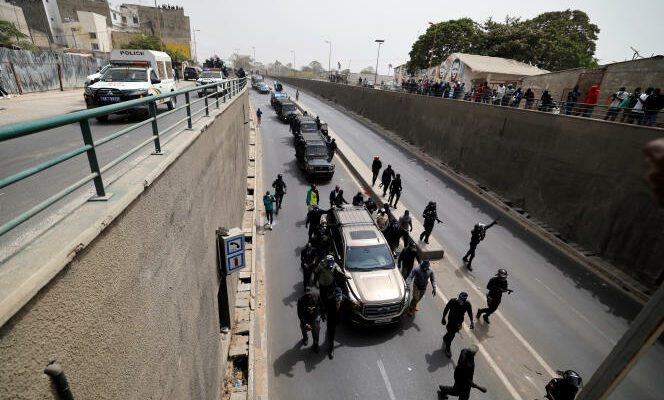Senegal experienced a new outbreak of fever on Thursday, February 16 around opponent Ousmane Sonko, who was forced out of his car and brought home in an armored police van after appearing in court. This is the last and spectacular confrontation between Ousmane Sonko and the power, in a climate of growing tension a year before the presidential election. The polling date was set for Thursday, February 25, 2024.
The images, published live on social networks, show men in helmeted and masked uniforms, visibly gendarmes, surrounding the car in the back of which Mr. Sonko is and from which he refuses to leave, on the way back a defamation trial in the Dakar court. His presidential eligibility could depend on the outcome of this trial.
“Am I under arrest? », asks Mr. Sonko to the gendarmes. The men in uniform answer him in the negative and tell him that they have received the order to drive him home. Previously, Mr. Sonko had explained by telephone to a commissioner that he would only come out if he was under arrest.
A gendarme ends up pulverizing the rear window with his elbow. The men in uniform operate the door opening from the outside and extract, by pulling him by the arms, Mr. Sonko, who, apparently impassive, resists for a few moments then allows himself to be taken away. Other images show him getting out of a police van in front of his house some time later.
Shows of strength
These incidents confirm Mr. Sonko, third in the 2019 presidential election and candidate for that of 2024, as the main character, for the moment, of the competition. Another actor, President Macky Sall himself, maintains the vagueness on his intention to override or not the constitutional objections and to run for a third term.
If the campaign is far from having officially started, Mr. Sonko, 48, is increasing the gatherings that look like demonstrations of force, while Mr. Sall, 61, after a year at the head of the African Union, has been stepping up operations to promote its action since 2012.
Mr. Sonko, popular among young people in a population of which more than half is under 20, has come into confrontation with power. Charged in a case of alleged rape, tried Thursday for defamation, he shouts at the conspiracy intended to dismiss him and the instrumentalization of justice by the power of President Sall, which the latter refutes. On the eve of his trial, Mr. Sonko was spreading attacks against Mr. Sall, “who imagines he can enslave the country where the colonist and others before him have failed”.
Authorities have banned many opposition rallies in recent months. In recent weeks, dozens of supporters of Mr. Sonko, but also activists, have been arrested. Last week, the town of Mbacké was the scene of clashes, looting and looting after a rally around Mr. Sonko was banned. Thursday morning, the police, deployed in large numbers as at each summons of Mr. Sonko, fired tear gas at his supporters who wanted to enter the court where he was on trial.
Trial adjourned to March 16
Mr. Sonko is being sued by the Minister of Tourism, Mame Mbaye Niang, for “defamation, insults and falsehood”. After it opened, the trial was adjourned to March 16.
In March 2021, Mr Sonko traveled with a massive crowd to a summons before a judge in an alleged rape case. His arrest on the way had helped trigger the most serious riots known for years in Senegal. The disturbances had caused a dozen deaths. Justice ordered in January the referral of Mr. Sonko to court in this case. No trial date is known.
Newsletter
“The Africa World”
Every Saturday, find a week of news and debates, by the editorial staff of “Monde Afrique”
Register
But the case of defamation is attracting increasing attention, the texts providing for removal from the electoral rolls, and therefore ineligibility, in a certain number of cases of conviction.
